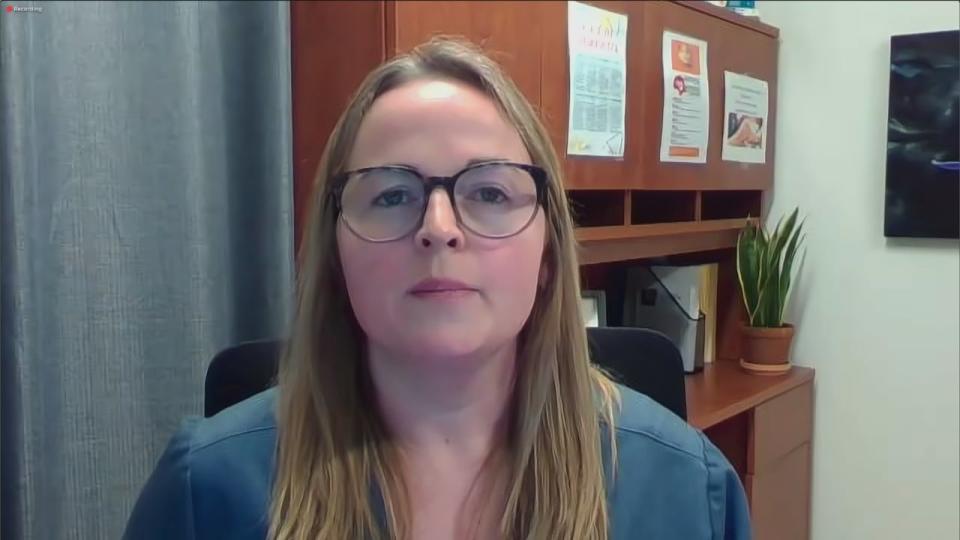Number of dementia patients in Ontario has risen 48% since 2010, new data released by OMA shows

New data shows that the number of people with dementia is rapidly growing in Ontario and doctors are urging the province to invest in home care now to meet their needs.
There has been a 48 per cent increase in the number of patients with dementia in Ontario since 2010, according to a new analysis of Ontario Health Insurance Plan (OHIP) billing released by the Ontario Medical Association (OMA) on Thursday. The OMA represents more than 43,000 doctors.
Dr. Andrew Park, president of the OMA, said resources need to be put in place to better support the province's aging population and people with dementia.
"With an already strained health care system and fewer than 300 dementia care specialists across Canada, we are not prepared to meet their needs," Park said at a virtual news conference.
"This is an issue that needs urgent attention from all levels of government so people can get the care they deserve and our health care system can withstand rising pressures."
Park said dementia is a blanket term for a number of diseases that impact memory and cognitive ability and that interfere with the person's ability to perform daily activities. Alzheimer's disease, the most common form of dementia, represents 60 to 70 per cent of cases.
He said dementia is the seventh leading cause of death around the world and a major cause of disability and dependency among older adults. He said dependency impacts the individuals who have dementia and their caregivers, family and communities.

Dr. Andrew Park, president of the Ontario Medical Association, says: 'This is an issue that needs urgent attention from all levels of government so people can get the care they deserve and our health care system can withstand rising pressures.' (CBC)
Park said dementia care in Ontario occurs mainly in institutional settings, such as hospitals and long-term care homes.
"We need to change this. Most people living with dementia prefer to remain at home and out of long-term care homes for as long as possible. This helps preserve the quality of life," he said.
In 2020, Park said there were 82,000 home care visits to Ontario residents living with dementia. But according to an analysis by the Alzheimer's Society of Ontario, 2.5 million annual home visits were needed to provide adequate support.
"That's a significant gap in capacity versus demand. Ontario's doctors know that it is important that we act now to shape the future of dementia care and Ontario," Park said.
Community support services need to grow: geriatrician
Dr. Alexandrea Peel, a geriatrician and chair of rural senior care at the Gateway Centre of Excellence in Rural Health in Goderich, Ont., said the total number of people with dementia is increasing because people are living longer with more complex health problems.

Dr. Alexandrea Peel, a geriatrician, said it's estimated that community support service budgets would need to grow by 25 per cent to meet current demand. (CBC)
Peel said the province estimated the cost of home care in 2020 was $103 a day. In comparison, the cost of long- term care was estimated to be $201 a day and the cost of a hospital stay was estimated to be $730 a day.
She said home care includes nursing care, physical therapy and help with dressing or bathing, while community support services include transportation, meal support and respite care for caregivers.
"These types of services are very cost-effective for the province," she said.
Peel said it's estimated that community support service budgets would need to grow by 25 per cent to meet current demand.
"And budgets would need to continue to grow each year as the population continues to age and the number of people with dementia and frailty continues to increase. But remember, this will always come at a fraction of the cost of hospital and long-term care," she said.
"Dementia and frailty care affects us all. We need to transform and modernize how we provide care for older people."
System not set up to support growing numbers: doctor
Dr. Linda Lee, a family physician and executive director of the MINT Memory Clinic, a non-profit organization helping to establish memory clinics in primary care, said more than 500,000 people in Canada live with dementia and that number is expected to triple by 2050 to 1.7 million, according to the Alzheimer's Society of Canada.
"Our current health-care system is not set up to support the growing number of individuals living with dementia or their family care partners and there are real system related challenges ... that prevent people from accessing a timely diagnosis and accessing the services and supports that they need," she said.
Lee said the current health care system is reactive and driven by crisis.
"We need to leverage Canada's strong infrastructure of primary care and enable it to deliver high quality, accessible dementia care no matter where people live," she said.

